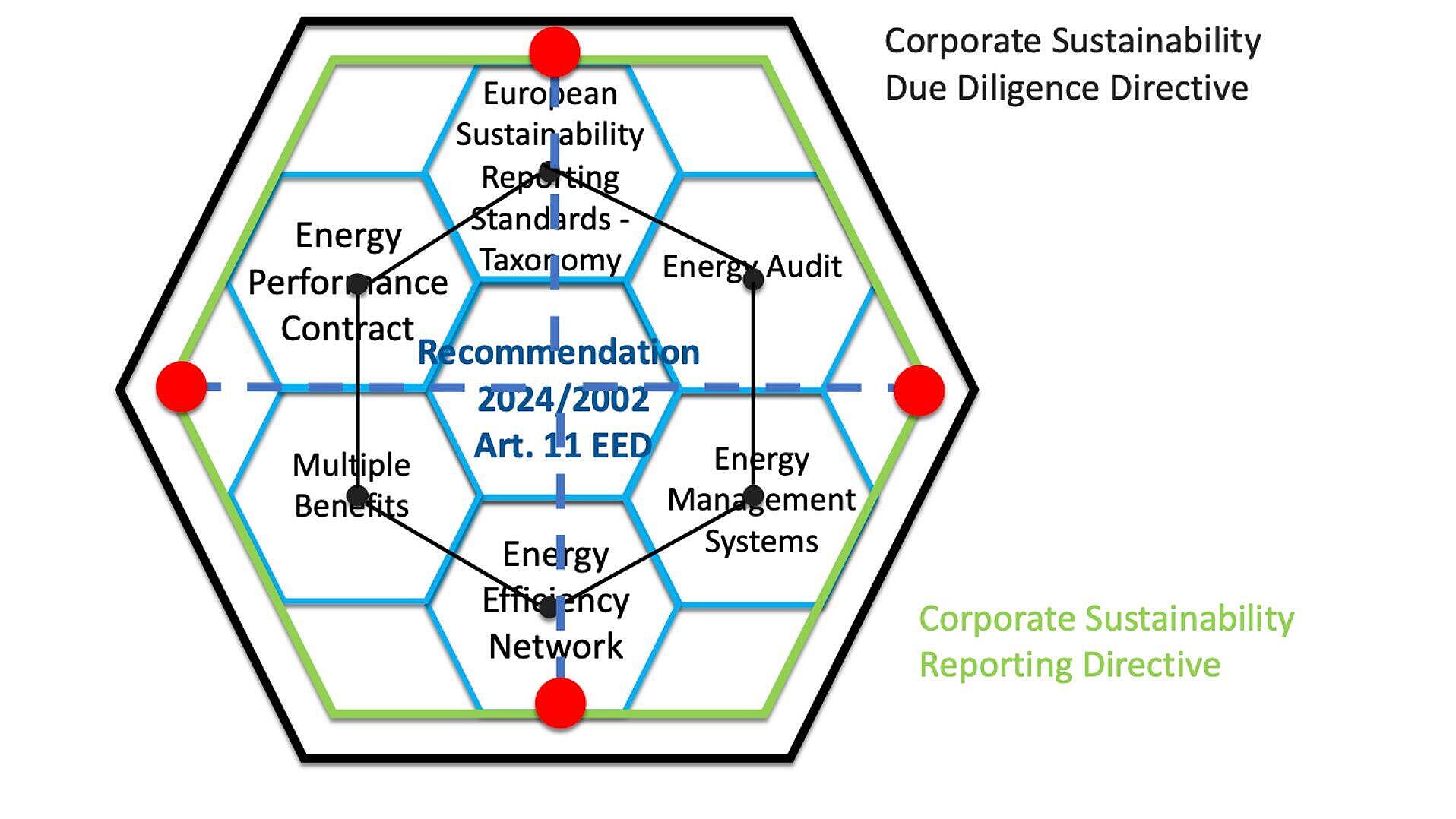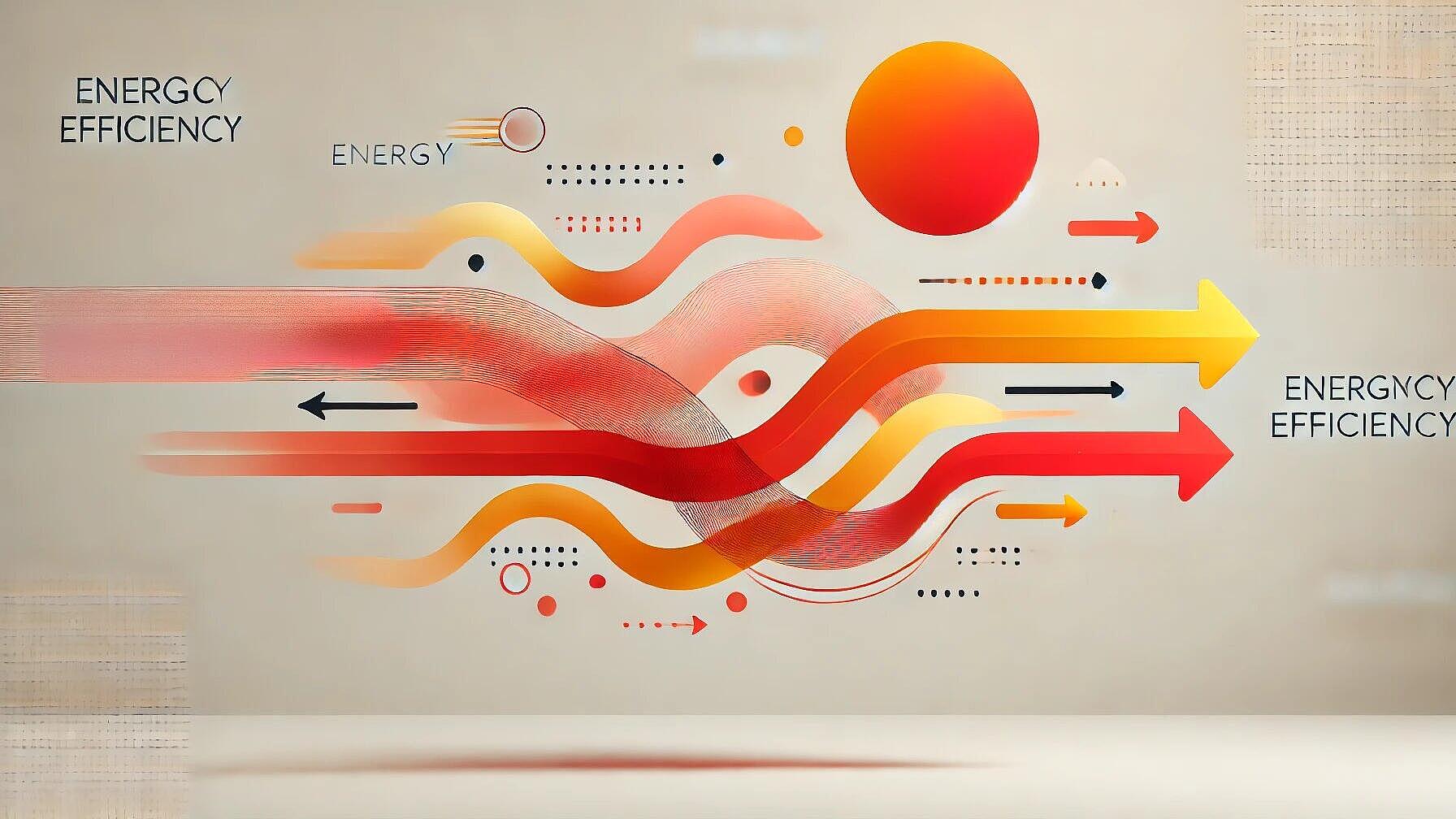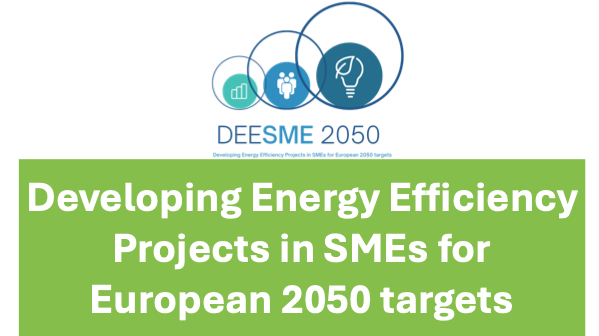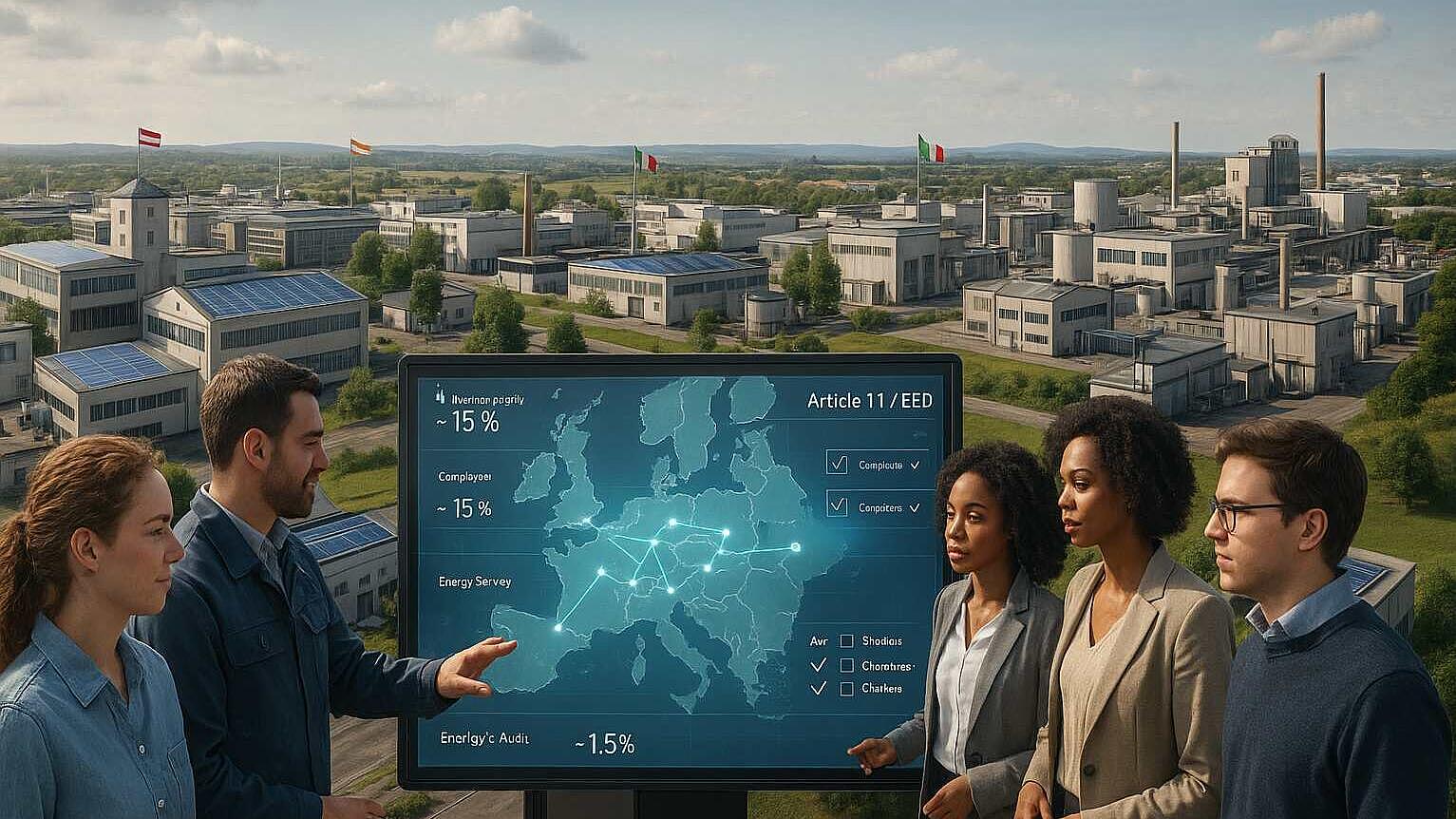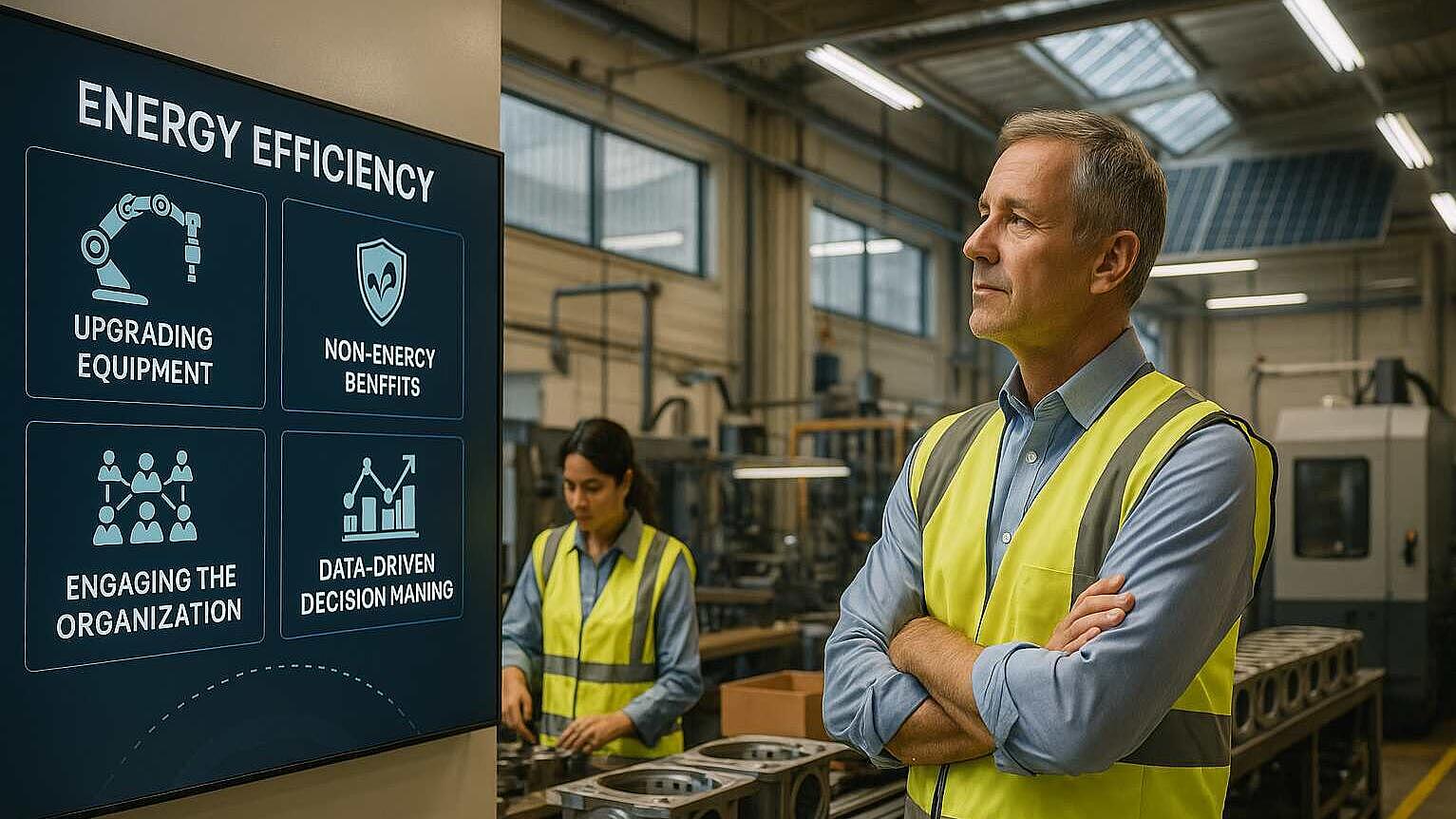 Energy Efficiency
Energy EfficiencyEnergy Efficiency
Connecting the dots of Energy Efficiency Directive with sustainable finance reporting. The full potential unlocked.
Recommendation 2024/2002 issued by the European Commission provides guidance on implementing the Energy Efficiency Directive (EED) in harmony with the Corporate Sustainability Reporting Directive (CSRD) and Corporate Sustainability Due Diligence Directive (CSDDD). The recommendation emphasizes the integration of energy audits and energy management systems, the financing of energy efficiency, and reporting activities related to sustainability, which are now mandatory for many enterprises. Energy Efficiency Networks are encouraged, particularly for SMEs, to share experiences and expertise for enhanced efficiency and greenhouse gas emissions reduction. The recommendation highlights the monetization of non-energy benefits from energy efficiency measures, such as improved business performance and air quality, as well as the adoption of renewable energy sources. Energy performance contracts are also detailed, where payment is linked to actual energy savings, which can offer regulatory exemptions when aligned with the EED. ESRS reporting standards call for transparency in financial and sustainability performance, including energy. Reporting under EED must align with the ESRS, obliging companies to document energy consumption and efficiency measures' implementation rates in their annual reports. While Recommendation 2024/2002 does not explicitly connect with other directives, it prompts member states to consider the integration of EED requirements with obligations of CSRD and CSDDD during their transposition process. These complementary directives aim to enhance corporate sustainability reporting and due diligence across companies' activities and supply chains for sustainability purposes. The approach is iterative, encouraging continuity in compliance reporting and promoting the widespread adoption of energy efficiency and climate mitigation measures.
Read Full articleDigital Supply Chain Dynamics: Insights from Indonesia’s Food and Beverage Industry
The study explores how digitalization enhances operational performance in Indonesia's food and beverage sector, stressing improvements in quality, productivity, and cost efficiency through technologies like IoT, robotics, cloud computing, and blockchain.
Read Full articlePowering Europe's Clean Energy Future: Key Elements of the EU Energy Efficiency Directive
The EU Energy Efficiency Directive sets binding targets to reduce energy use by 2030 and introduces measures across sectors for energy savings, prioritizing efficiency, sustainability, and enhanced energy security for European citizens and businesses, requiring member states to implement various efficiency strategies and reporting mechanisms.
Read Full articleMore support being given to SMEs in Europe to become more energy efficient
The European Investment Bank Group, with European Commission support, will provide €17.5 billion in financing for over 350,000 European SMEs to enhance energy efficiency, nearly doubling current aid, aiming for a total investment of over €65 billion by 2027.
Read Full articleSpotlight on EU funded project – Unlocking SME potential: Financing energy efficiency for a sustainable future
The paper emphasizes the importance of energy efficiency in European SMEs, which are crucial to the continent's economy and competitiveness. The EU-funded DEESME 2050 project highlights the potential benefits of improving energy performance in the furniture industry. Investments and policy implementation must accelerate to meet the EU's 2030 climate goals, and new initiatives like EEEFC aim to support this transition. Financial intermediaries are identified as vital for SMEs to access funds, leveraging experiences from organizations like EEIP and state-owned banks to facilitate this process.
Read Full articleDigital Revolution in Motor Systems: Powering the Future of Energy Efficiency
The paper highlights the revolution of motor systems through digital technologies enhancing efficiency, despite challenges such as lack of standardization and cybersecurity risks. Innovations include smart sensors, IoT, and AI-driven analytics, with case studies showing significant energy savings. Opportunities exist for professionals in data science and cybersecurity.
Read Full articleUnlocking True Value: Why Multiple Benefits Are the Future of Energy Efficiency
The M-Benefits project reveals that energy efficiency investments often overlook crucial benefits like product quality, operational risk reduction, and competitiveness. This gap persists despite clear profitability, as conventional appraisal methods focus narrowly on energy savings. The project provides tools, training, and case studies to help professionals communicate and leverage a project's full value, urging a shift to encompass strategic business outcomes, beyond mere technical improvements.
Read Full articleOvercoming Barriers: How Article 11 of the Energy Efficiency Directive Is Driving Real Change Across Europe
DEESME project enhances EU energy management via collaboration, clear communications and focusing on multiple benefits, addressing challenges SMEs face in compliance, audit quality, and recognizing wider advantages of energy efficiency beyond savings.
Read Full articleFive Big Steps for a Smarter, Greener Europe: Rethinking National Energy Schemes
The DEESME project aims to simplify energy efficiency for European SMEs by providing practical national scheme recommendations that are user-centered, highlighting benefits, and making policy guidelines clear and accessible, alongside incentivizing benchmarking and carbon footprint tracking.
Read Full articleBeyond Energy Savings: How European SMEs Are Leading the Way with the Multiple Benefits Approach
The DEESME project demonstrates how SMEs across Europe benefit from integrated energy audits by achieving energy savings and unlocking multiple business advantages, such as enhanced innovation, employee satisfaction, and resilience.
Read Full article